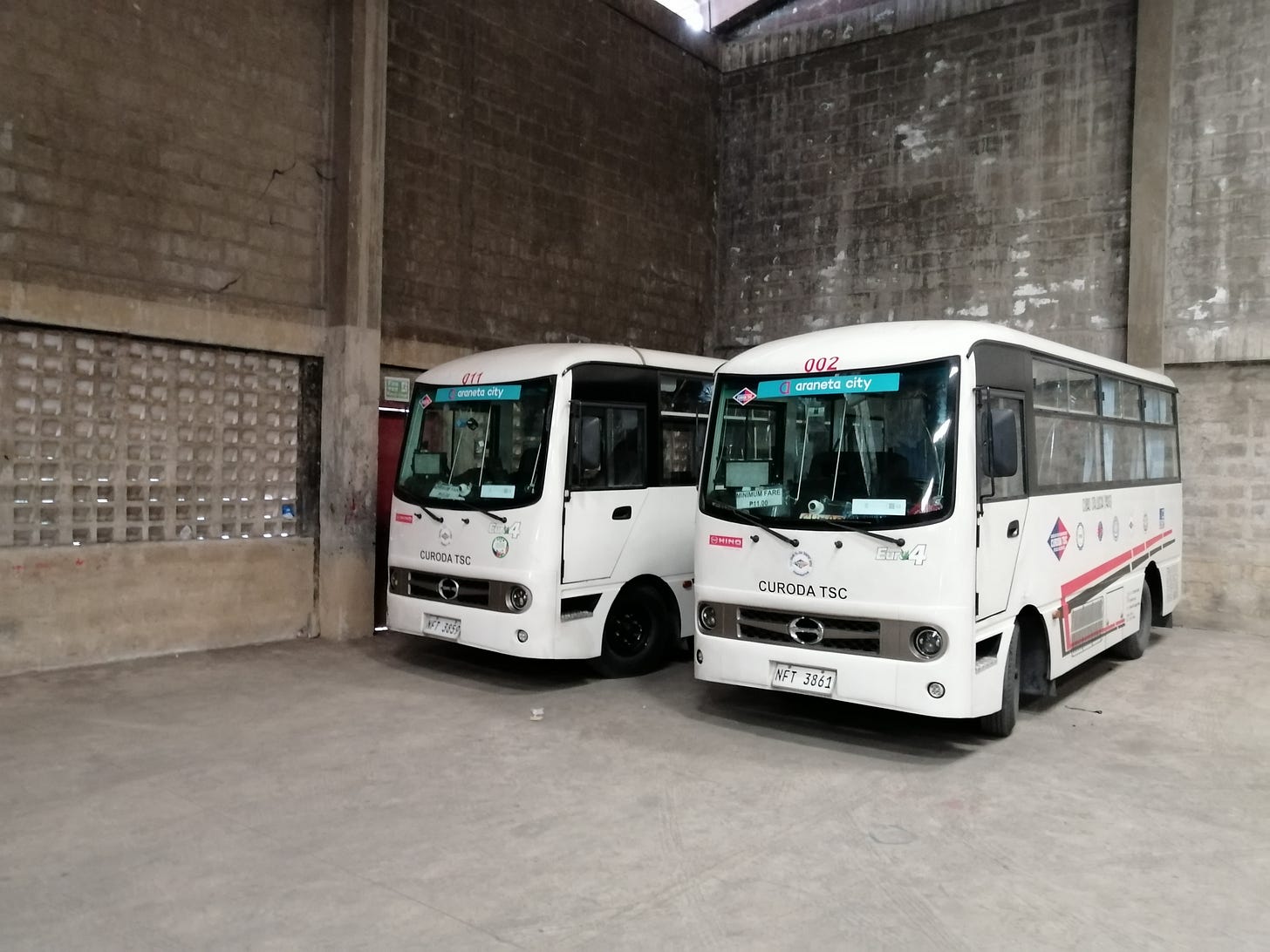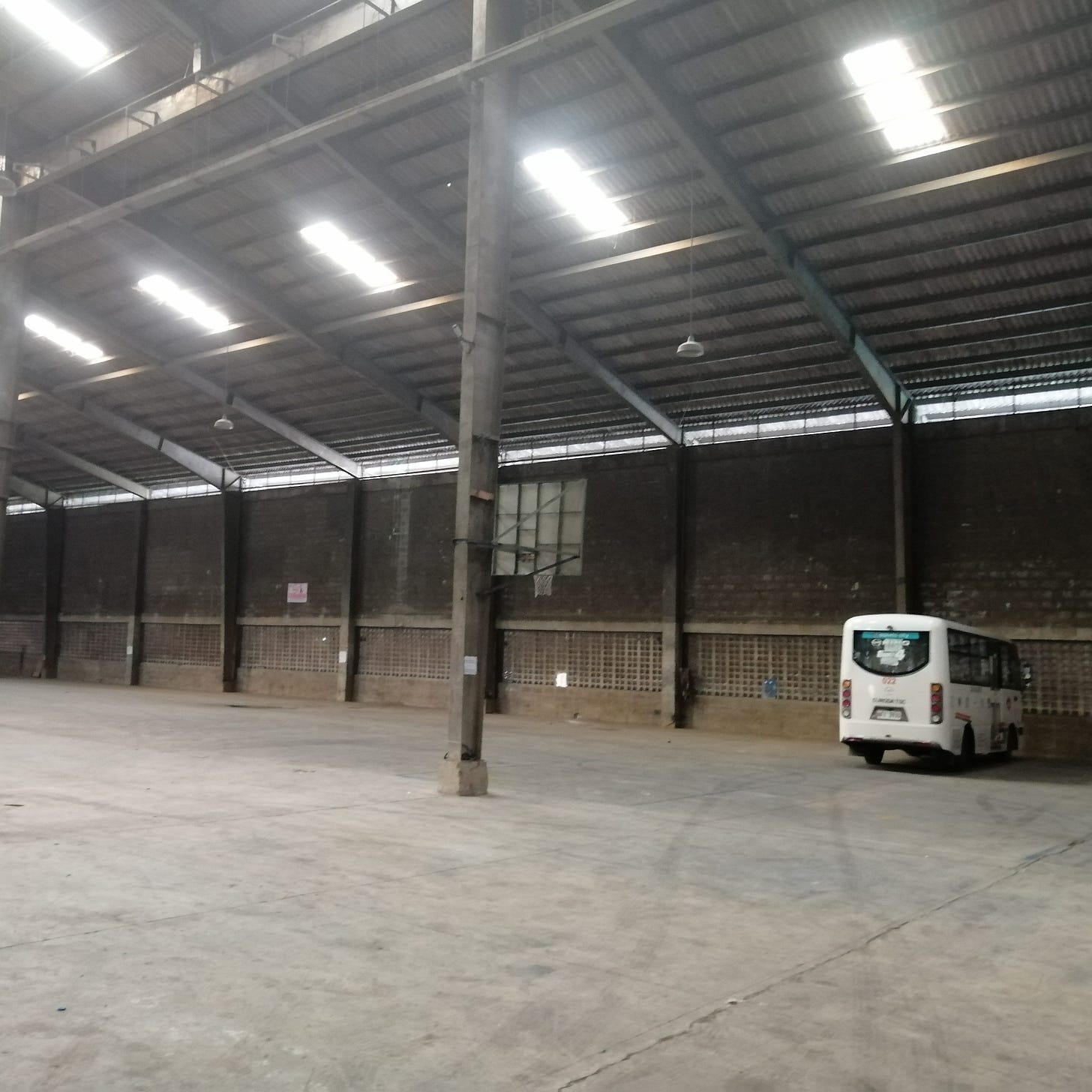How a Pasig City jeepney cooperative managed to survive the pandemic
But nonetheless, the transport group still appeals for more government support
(The piece below was written in mid-2021 as part of a longer work and was supposed to be submitted to meet the requirements of a writing grant that was cut short during the same year. As a result, some information may already have changed.)
These two modern jeepneys form part of the first batch of vehicles acquired by the Cubao Rosario Sta. Lucia Transport Service Cooperative in 2019.
In late 2004, Raul Padrigo, a retired Philippine Navy officer, received a death threat on his mobile phone.
The sender of the text message seemed to know who he was.
The message addressed him by the first syllables of his two children's names, which were painted on the traditional jeepneys he owned, Padrigo said in a face-to-face interview in March 2021, when wearing face masks were still compulsory owing to the COVID-19 pandemic.
"RonJen," Padrigo recalled the text message as saying, "Your life can't be worth more than P10,000."
He later reported the incident to the police.
Fortunately, nothing untoward happened to Padrigo, his family, or, for that matter, the 150 members of the organization he headed at that time: the Cubao Rosario Drivers and Operators Association (CURODA), one of the transport groups that served the route the organization is named after.
Padrigo, who served under the Philippine contingent of a UN peacekeeping force in East Timor in the 1990s, knew what the threat was all about.
A few months before, the CURODA president put together a plan and coordinated with transport officials for a secret operation. The group was assigned to track down, apprehend, and impound "colorum" vehicles, or jeepneys that didn't have permits to ply the route CURODA members were serving.
Starting at five in the morning, the operation was able to identify and impound 11 vehicles belonging to two separate associations whose members were legally entitled to ply the same route.
"Some [apprehended] jeepneys had franchises but these were only for routes in Cavite, Pangasinan, and Tarlac," Padrigo said.
These "colorum" vehicles became brazen enough to pick up and drop off passengers on the route that CURODA served because they paid yearly fees and daily "butaw" (dues) to the associations which accepted them as members, a transport expert said.
This illegal arrangement was tolerated by the transport associations because the more members they accepted (whether they had franchises or not), the higher the fees they got, the expert added.
"Not all associations are like this but a number of them are like the Mafia, just collecting protection money," the transport expert said. "The arrangement is tolerated because drivers and operators just want to get along."
Larry Corbe used to drive taxicabs for a living. He’s now CURODA-TSC’s vice-chairman.
'Take traditional jeeps off the streets'
More than 15 years after helping rid the Cubao-Rosario route of "colorum" jeepneys, Padrigo has changed.
And so has his organization.
Nevertheless, Padrigo isn't too excited about seeing traditional jeepneys on the road, "colorum" or otherwise.
After all, traditional jeeps have cut the earnings of the organization that Padrigo currently chairs: the Cubao Rosario Sta. Lucia Transport Service Cooperative (CURODA-TSC). The Pasig City-headquartered jeepney cooperative, which evolved from the now-defunct CURODA, operates 30 airconditioned modern jeepneys [at the time this piece was written] on the very same route Padrigo helped clean up more than a decade ago.
Previously an association of jeepney owners that had their own individual franchises, CURODA is now a jeepney cooperative which holds one franchise for all vehicles serving the same route.
Which means that under the Public Utility Vehicle Modernization Program (PUVMP), no other organization except CURODA is authorized to serve that route.
Therefore, jeepney drivers with their own individual franchises are required to join CURODA if they wish to continue serving the Cubao-Rosario route. They would be considered "colorum" otherwise.
However, at that time, some jeepney drivers and operators chose to take their own sweet time before joining CURODA.
After all, the deadline for jeepney consolidation was set for early 2020, a little more than two years after the PUVMP required them to put up or join cooperatives.
Unfortunately, the pandemic — and the ensuing lockdown — made the jeepney modernization program a little more complicated.
The consolidation deadline would later be extended seven times, ending finally in December 2023.
Meanwhile, during the years immediately before and during the lockdowns, whenever an individually-owned jeepney plied the route that CURODA served, the cooperative lost money. The same thing happened when the government offered free bus rides, picking up and dropping off commuters who were supposed to be served by CURODA.
"Traditional jeeps are one of the factors that have cut our income by more than 50% during the pandemic," Lauro "Larry" Corbe, vice-chairman of CURODA said, in a 2021 face-to-face interview. "They should already be taken off the streets."
Shown is the interior of CURODA’s garage in Pasig City.
Pasig City jeepney coop seeks gov't support
Shortly after the jeepney modernization program was announced in 2017, 15 members of CURODA, the association, got together to comply with the scheme.
Each one put up P20,000 each or a total of P300,000 to show proof that the group is financially capable of running a transport cooperative.
After securing its registration with the Cooperative Development Authority (CDA) in October 2018, the newly-established organization took out a lease and forked out a P600,000 security deposit for a garage. CURODA also agreed to pay P168,000 a month in rent for the garage that is the size of roughly four basketball courts in Pasig City.
It currently pays another P200,000 in rent for its terminal in Quezon City.
The jeepney coop then borrowed a little more than P60 million from the Development Bank of the Philippines (DBP) to acquire its 30 modern jeeps, which were delivered in November 2019. Each unit, worth P2.2 million, has a monthly amortization of more or less P30,000. These special jeepney modernization loans require five percent downpayment, charge six percent annual interest, and provide a seven-year payment period.
Recently, the coop spent P277,000 for preventive maintenance, which covers, among others, oil filter replacements of all its units.
The jeepney's fleet management system, which helps vehicle dispatching, costs P1,500 to use, or a total of P45,000 monthly.
All these — garage, terminal, preventive maintenance, the fleet management system, and of course, the new jeepneys themselves — are requirements of the jeepney modernization program. These are indicated in the LTFRB's Memorandum Circular 2019-066 also known as the Simplified Process for Applications for the Consolidation of Individual and Existing Franchise Holders in Compliance with the PUVMP and the Department Order No. 2017-011 (OFG).
In the middle of 2020, when mobility restrictions were eased, CURODA was finally allowed to pick up passengers after the three-month lockdown.
Raul Padrigo, CURODA chairman, previously served under the Philippine contingent that was part of a UN peacekeeping force in East Timor in the late 1990s.
However, since it didn't want to spread, let alone be the cause of infection, the coop had to spend an additional P40,000 a month, just for rubbing alcohol supplies alone.
"The passenger cabin is disinfected every time the jeepney reaches the terminal," Padrigo said.
To defray these substantial costs, CURODA put up its own gasoline station in November last year. Installed near its garage entrance, the members-only gas station earns P5,000 a day, according to Corbe.
The coop is currently in talks with a company for possible advertising inside the jeepneys, Corbe added.
Nothing has been signed yet, as of this writing.
But one thing's for sure.
If constantly changing mobility guidelines continue to hamper its trips, the Pasig-City headquartered coop can manage to stay afloat for only one more year.
"Other jeepney coops already have millions in unpaid debt," said Corbe in mid-2021. "We haven't reached that point yet. We can still manage for one more year by covering costs out of our own pockets little by little."
He added: "We have embraced the jeepney modernization program. Why should we be the ones to sacrifice when in fact, we should be supported?"






